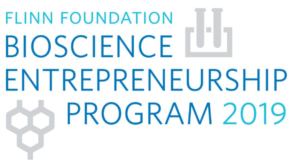
Ordinatrix, a startup company launched by Biodesign Institute Executive Director Joshua LaBaer, is one of six bioscience firms from Phoenix and Tucson selected to participate in the Flinn Foundation’s 2019 Bioscience Entrepreneurship Program. Ordinatrix, a Phoenix-based company, will receive $30,000 in funding support and program services through a nonprofit partner. The services include “a professionally developed, yearlong plan specific to the needs of the company, helping them navigate the challenges facing startups and empowering them to become investor-ready.”
“The firms selected this year for the Bioscience Entrepreneurship Program demonstrate the vibrant health of Arizona’s bioscience ecosystem, particularly among our university partners,” said Tammy McLeod, Flinn Foundation president and CEO. “By providing funding at this early stage, plus tailored support, we’re trying to help these six companies become integral contributors in that ecosystem.”
“The Flinn Foundation continues to lead the way as we work to build a stronger Arizona bioscience economy,” said LaBaer, a professor in the School of Molecular Sciences at Arizona State University. “Our multi-disciplinary approach at the Biodesign Institute gives us the knowledge and the tools we need to bring new diagnostics and therapeutics to the market effectively and quickly. The Flinn Foundation’s entrepreneur program is an important stimulus, especially for small companies trying to get started.”
As Ordinatrix CEO, Jim Hauert will lead the commercial efforts, including sales, marketing, communications and market access for the company. Ji Qiu, a research professor in the Biodesign Virginia G. Piper Center for Personalized Diagnostics, is a founder and collaborator.
Ordinatrix evolves from LaBaer’s focus on the field of proteomics, primarily directed toward application in personalized diagnostics.
Ordinatrix’s mission is to be the leader in translational proteomics and offer researchers a disruptive tool for the analysis of protein function. The company’s ActiveArrays can place a human protein microarray on a small slide for the research and development of new drugs, biomarkers, and other precision-medicine tools. The biotech and biopharma sectors, researchers and physicians are likely customers for the Ordinatrix microarrays.
With this year’s class of entrepreneurs, the Flinn Foundation has surpassed providing $1 million in funding support to benefit Arizona bioscience startup companies. Since the program began in 2014, 34 Arizona bioscience firms have participated in the program. The program supports the goals of Arizona’s Bioscience Roadmap, the state’s long-term strategic plan through 2025 to advance the bioscience sector.
Last year, Ordinatrix was also one of three startups selected by Skysong Innovations to receive $25,000 in a new accelerator and competition for ASU startups.
LaBaer, along with Karen Anderson, licensed their antibody-based breast cancer biomarkers to Provista Diagnostics, which employed them in their Videssa Breast product in 2017. The first-of-its-kind blood-based test detects breast cancer, reduces false positives and provides a diagnostic tool to complement breast imaging, especially in dense breast tissue situations.
For the Flinn program, Ordinatrix was selected from 28 applicants. Last year, Gemneo Bioscience, a start-up led by Biodesign’s Joseph Blattman, was selected to participate.
“The Flinn Foundation Entrepreneurship Program provided an invaluable opportunity for Gemneo to receive feedback from business professionals and hone its business plan,” said Gavin Chandler, Gemneo’s CEO.
Over the past five years, Arizona State University start-ups have been well-represented. Past ASU student or faculty entrepreneurship program participants include Vapometry Biolabs (now NanoCheq), Biosensing Instrument, Omica Science (now BioSyntagma), Breezing, Epifinder, Neolight, Endovantage, NextPotential, Pollen-Tech, Sio2nanoteh and Arbsource.
In addition to Ordinatrix, the 2019 Flinn entrepreneurship program winners include AdvilNow Medical, CATS Tonometer, Desert Valley Tech, Emagine Solutions Technology and NANOPEC.
The $30,000 grant for each firm will be awarded to and administered by the nonprofit Arizona Bioindustry Association, a trade association that promotes the growth of Arizona bioscience companies.
Opportunities are also offered to participating firms to engage with the state’s bioscience, academic, and policy leaders, including a year as a member of Arizona’s Bioscience Roadmap Steering Committee. The committee is comprised of about 100 leaders from the public and private sectors that gathers quarterly to discuss major research, business, and policy developments that impact the biosciences in Arizona and explore opportunities to advance the sector. The companies also receive a complimentary membership to AZBio for one year.
The selected firms must be engaged in the commercialization of bioscience research and biotechnology and/or the sale of products in the areas of medical devices and equipment; drugs, pharmaceuticals and diagnostics; agricultural feedstock and chemicals; research, testing and medical labs; or bioscience-related distribution—the industry categories recognized together as the biosciences in Arizona’s Bioscience Roadmap.
The application for the 2020 Flinn Foundation Bioscience Entrepreneurship Program will be available later this year at www.flinn.org/entrepreneur.
The Flinn Foundation is a privately endowed, philanthropic grantmaking organization established in 1965 by Dr. Robert S. and Irene P. Flinn to improve the quality of life in Arizona to benefit future generations. In addition to advancing the biosciences, the foundation supports the Flinn Scholars Program, a merit-based college scholarship program; arts and culture; and the Arizona Center for Civic Leadership.
